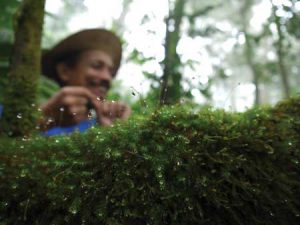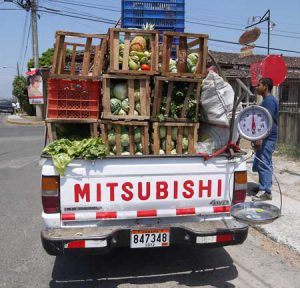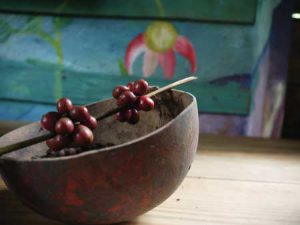
By Marika Hirtle-Lewis
We boarded a truly tiny plane, destination Panama’s Guna Yala comarca (indigenous territory). The flight was only an hour long, but Panama City’s skyscrapers were out of mind upon discovering the community of Uggubseni. Modern plumbing is a rare luxury in this island town of thatched houses where water is almost potable (at best). There is no garbage removal, making ‘slum’ a pretty accurate description. People there are aware of their problems, but all are proud to be Guna.
I have spent the winter term in Guna, along with 25 other McGill

students (and three Panamanian students), as part of the Panama Field Study Semester (PFSS), a joint venture between McGill and the Smithsonian Tropical Research Institute (STRI) in Panama. The four-month, 15-credit program focuses on issues relevant to the understanding of the Latin America tropical environment.
The days following my arrival were a whirlwind of cultural immersion and fieldwork in the corals, sea grass and mangroves, part of a long-term assessment of coral health in the region, under the supervision of biologists Catherine Potvin and Hector Guzman. During our time there, we were confronted with ethical dilemmas and our cultural perceptions. But every night, we spent memorable hours with our host families.
And then I had a profoundly conflicting experience: we met Bono. Yes, U2 Bono, sunglasses in place.

Now the reason for my conflict is murky and many-fold: ethically I had a vague feeling of superiority at immersing myself in the culture while he was ‘being a tourist.’ I felt we held the moral high ground, but selfishly, I also felt like our ‘profound cultural experience’ had been marred.
It took me time to examine what came to be called ‘the Bono incident’, but I now look back on it like a funny, yet telling, learning experience.
But I am getting ahead of myself. The PFSS program is structured in three blocks for the three courses designed to help us develop field study techniques in biological and social sciences, as well as a more critical, pluralistic worldview. Each week there is a field trip of 2-3 days where we explore themes of each course. Throughout the program, each of us did an internship with local organizations and STRI.
In Neotropical Environment, we learned biology fieldwork techniques addressing topics in the Panamanian environment. We explored STRI’s Barro Colorado Island research institute, and performed a mammal census at night, visited national parks, collected insects and visited amphibian reserves.
In the Humans in Tropical Environments course on human geography, we studied how humans relate to their environment, looking at lifestyle changes through time. We addressed issues such as globalization, gentrification, development and free trade market economies and their impacts. We asked what it means to have agency, and what the difference is between agency and power. We talked politics, economics, ethics and philosophy.
These issues were new to me, as a biology student. I have opened my eyes to the complexity of global issues, and gained tools to address them. Great professors shared their wisdom and of course, the combined knowledge of our inter-disciplinary group is phenomenal: everyone was passionate, interesting and knowledgeable, and they taught me as much as our professors.
In the third course, Sustained Tropical Agriculture, we learned agricultural techniques hands on, visiting sugar productions, vermiculture and dairy and rose producers.
When I took the plunge and registered for the PFSS, I fully expected it to be a fantastic cultural experience. I knew it would be a great learning opportunity. What I didn’t expect was the feeling that I was learning about life for the first time. Because here’s the thing: I’m a Biology student, studying the science of life and living organisms. But this program has brought me into the global village. My lenses have been shattered, as I realize I am part of a much bigger whole.

Many of my questions remain unanswered, and it has been thrilling and challenging for me to be conscious of the value of unanswered questions. They have taught me to reflect – to question my opinions in the light of my cultural lens, or my baseline. That is to say, I have learned the importance of understanding where I come from – my values, my sensibilities, my beliefs and my education – and using that to question why I think the way I think.
So few words could never summarize my experience. There are life-changing experiences that I didn’t talk about – couldn’t talk about – knowing I would not do them justice. One thing is for sure; on the eve of our return, I want to do it all over again.
For more information on the Panama Field Study Semester, visit www.mcgill.ca/pfss/.
Marika Hirtle-Lewis is a U3 McGill Biology student who just completed the winter term in the Panama Field Study Semester program.
